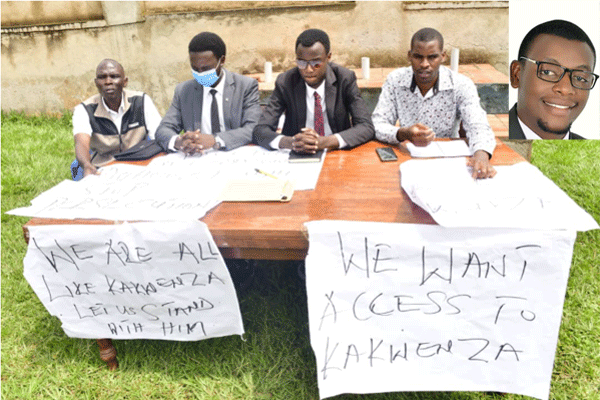
Novelist Kakwenza Rukirabashaija. PHOTO/FILE
|National
Prime
Kakwenza: A cocktail of grim confidence
What you need to know:
- Plain-clothed gunmen with hammers on December 28, reportedly surrounded and broke into the residential house of Kakwenza Rukirabashaija, a renowned novelist and political activist in Kisaasi, a Kampala suburb, before they took him to an unknown destination.
When he first emerged on my social media timeline after we became friends on Facebook in February 2017, Kakwenza Rukirabashaija was this lanky fella who appeared to live for three things: Dr Kizza Besigye, humour and suits.
His posts and photos revealed a very affable towering young man, who was always in the company of Opposition activists from the Forum for Democratic Change (FDC) party.
From pictures, he was only noticeable for his height. He appeared to enjoy the camaraderie of being around the activists. And elitism.
Kakwenza had already met Stella Nyanzi, who was trending after her fights with her former employers at Makerere University and vitriol directed at President Museveni and his family, when, on March 29, 2017, he tested the depth of the establishment criticism river with both feet.
“Every time this flibbertigibbet opens her mouth to speak, the public gets inundated by vitriol balderdash that comes from her malodorous mouth,” Kakwenza posted on Facebook.
It was a caption to a racy-lacy dressed woman on a boda boda with the head of a senior government official grafted on.
“She’s a……intellectually……[person] whose presence in this country is a total loss,” he added.
It was another 1,122 days before the State served the turning point in the life of the 33-year-old from Kebisoni in Rukingiri District.
On April 13, 2020, Kakwenza’s Easter Monday was rudely encroached on when security operatives raided his home in Kigulu South in Iganga District and yanked him off to an unknown location. He was held incommunicado for days as friends and family frantically searched for his whereabouts.
He was being held in Mbuya in Kampala but it would take a legal suit by Chapter Four Uganda and his lawyer Eron Kizza for Kakwenza to be released on police bond after a week in the dungeons.
Kakwenza had not been arrested for his social media engagements but his first novel, The Greedy Barbarian. He had self-published the book in February that year and anyone who read even the first few pages had an inkling who the protagonist-antagonist in the lead character of Kayibanda was.
As if to mirror what was to come, the writer was, upon release on police bond, charged with what gave a clear picture of what would come – spreading information that was likely to cause the spread of the disease.
The message was clear: his social media engagement was in check.
But his life as a novelist was in an even grimmer check.
“You man, you outdid yourself with that novel,” Kakwenza once quoted a woman telling him during his first incarceration.
“I knew you would be picked up. I read the first two chapters with my mouth open... Then when I got to the last chapter, I pitied you.”
A wave of anti-government sentiment led by the People Power movement was inebriating the youth when The Greedy Barbarian dropped. With almost everyone putting it at the foot of President Museveni, the success was inevitable.
“President Museveni felt that it was him that I had written about and so he sent his hoodlums to arrest and torture me,” Kakwenza said in his acceptance speech after scooping the 2021 International Writer of Courage by the prestigious PEN Pinter Prize in October last year.
From his home, days after his release, Kakwenza, limping and wincing every now and then, swore he would not be “challenging those guys again.”
“Those guys have no mercy, they can kill you,” he added glumly.
But with The Greedy Barbarian, Kakwenza had crossed the Rubicon. Stepping back was not an option. So where next after a bold bang like this book?
There was only one route left and that is of a grim confidence, one unencumbered by any threats. He was a child being cheered for climbing higher up a coconut tree.
He had earlier shared chapters of a romantic novel he was working on with this writer. This one borders on the extreme. But that is what Kakwenza has come to be known for. And now he was sharing one about a follow-up to The Greedy Barbarian.
The title settled on was Banana Republic: Where Writing is Treasonous. PEN Pinter would credit Kakwenza with showing courage in documenting his ordeal in detention when it was clear he would face the wrath of the State security for doing so.
“I boldly wrote my story without fear as a solace that the pen is mightier than the sword,” he said.
Weeks after publishing the second book, security operatives abducted him again in September. He had dared expose their methods of work and for that, he had to be ‘rebaptised’.
Unlike in the first arrest, this time pressure was widespread and Kakwenza was released. He changed his social media and acquired a South African-registered cell phone number, claiming security operatives had compromised his Ugandan lines.
With a come-grab-me-again-if-you-can attitude, he camped on social media, using verbose and cringe-inducing diction in regular posts about the President and his family.
The writer surely has the height for confidence that even his interrogators must be envious of. The trouble is that people who speak less and smile so often tend to write a lot. And the moment The Greedy Barbarian armed Kakwenza, he had turned into a fearless missile trained on one target.
Background

Kakwenza Rukirabashaija is the author of The Greedy Barbarian, a novel which explores themes of high-level corruption in a fictional country, and Banana Republic: Where Writing is Treasonous, an account of the torture he was subjected to while in detention in 2020.
International Writers of courage
In October last year, Kakwenza, who was detained over his novel The Greedy Barbarian, was named International Writer of Courage by Tsitsi Dangarembga. The award is part of the PEN Pinter prize, which goes to an author deemed to have fulfilled Harold Pinter’s aspiration to “define the real truth of our lives and our societies”
In 2020, Eritrean poet Amanuel Asrat was named International Writer of Courage. The author, imprisoned without charge since 2001, was chosen to share the PEN Pinter prize by 2020’s winner Linton Kwesi Johnson. Accepting the prize, Jamaican dub poet named Asrat, a poet, critic and editor-in-chief of the newspaper Zemen, as the International Writer of Courage winner with whom he would share his prize.

Writers: Amanuel Asrat, Chimamanda Ngozi Adichie and Stella Nyanzi.
In October 2019, Ethiopian writer, activist and co-founder of blogging platform Zone 9 Befeqadu Hailu, was named International Writer of Courage at the PEN Pinter Prize ceremony. At the time, Hailu said: “I think freedom of writing or freedom of speech is an intermediary path between change and violence. Many writers disdain violence. And yet, they write sour truth and encourage audiences to get out of their comfort zone to configure a better world. No war, no campaign has more power than writing to change the world without claiming lives.”
The year before, lawyer and human rights activist Waleed Abulkhair was named International Writer of Courage at the PEN Pinter Prize ceremony. The winner of the PEN Pinter Prize for 2018, Chimamanda Ngozi Adichie, made the announcement at the British Library on October 9, 2018.
Other PEN awards
On January 16, 2020: The Oxfam Novib/PEN International Award for Freedom of Expression 2020 was awarded to Ugandan academic, writer and feminist activist Stella Nyanzi.
A medical anthropologist by training, Ms Nyanzi has published widely in the academia on topics at the intersections of culture, health, law, gender and sexualities. She is an ardent writer on social media where she comments and debates about contemporary social-political occurrences.
Compiled from the Internet





